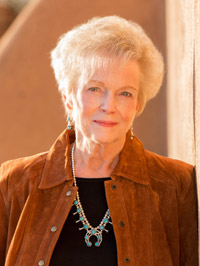Cleere uses old photographs she discovered during her research in captivating PowerPoint programs detailing the lives of women from across Arizona, in particular cultural and social settings, and in a range from artists and healers, teachers and entrepreneurs, women who plowed the land and those who were instrumental in establishing laws for the territory and the new state. Lecture topics include an overview of women from all walks of life in the program “Legacies of the Past: Arizona Women Who Made History.” This program may also be customized as follows:
“This Land is Our Land: Early Women on the Arizona Frontier”
“Oh Heavens! Saviors and Saints on the Arizona Frontier”
“Business Not as Usual: Arizona’s Early Women Entrepreneurs”
“Teacher, Teacher: Early Women Educators of Arizona”
“Pens and Paintbrushes: The Legacies of Early Arizona Women of the Arts”
“Order in the Court: Arizona’s Early Women Legislators and Lawyers”
An additional lecture, “They Knew No Boundaries: Pioneering Girls of Arizona,” features the stories of young girls who, before the age of eighteen, broke through social barriers, coped with the rawness and isolation of the early west, the lack of education, and sometimes the disparity between the races.
An interesting new program details the life of rodeo photographer Louise Serpa, who was the first woman allowed to photograph rodeo events inside the arena. Louise came from New York society and graduated from prestigious Vassar College. How in the world did she end up out west with her nose in the dirt and her eye glued to a camera? A fascinating story about an amazing Western woman.
An honors graduate from Arizona State University, Jan Cleere is an award-winning author, historian, and lecturer who writes extensively about the people who first settled in the desert southwest. Her research encompasses the lives of women who came from a variety of lifestyles and occupations to help shape the territory and the state. She has written five historical nonfiction books, been published several anthologies as well as a variety of regional and national periodicals. She is a member of the Arizona Humanities program Arizona Speaks and serves on the coordinating council of the Arizona Women’s Heritage Trail.

